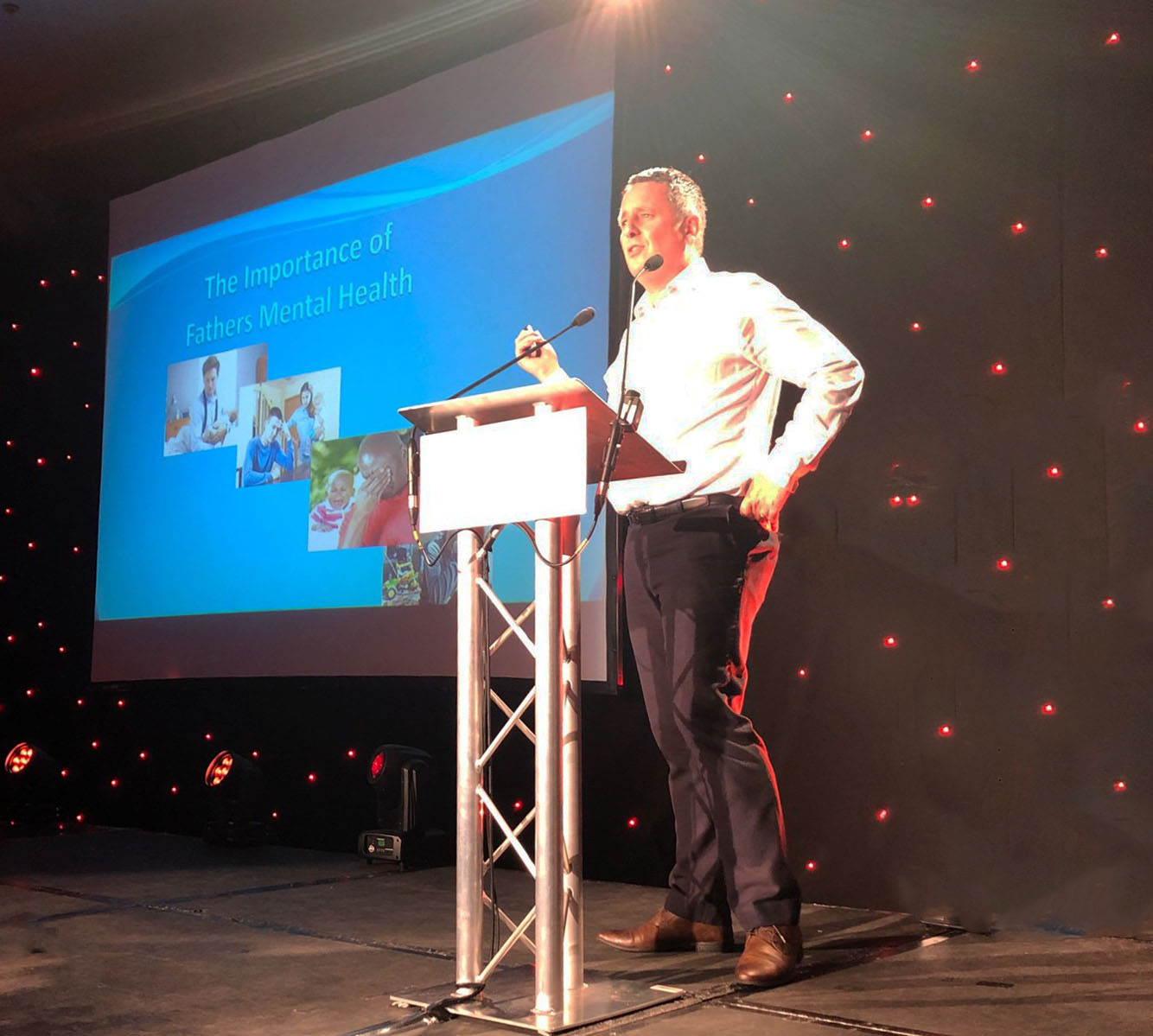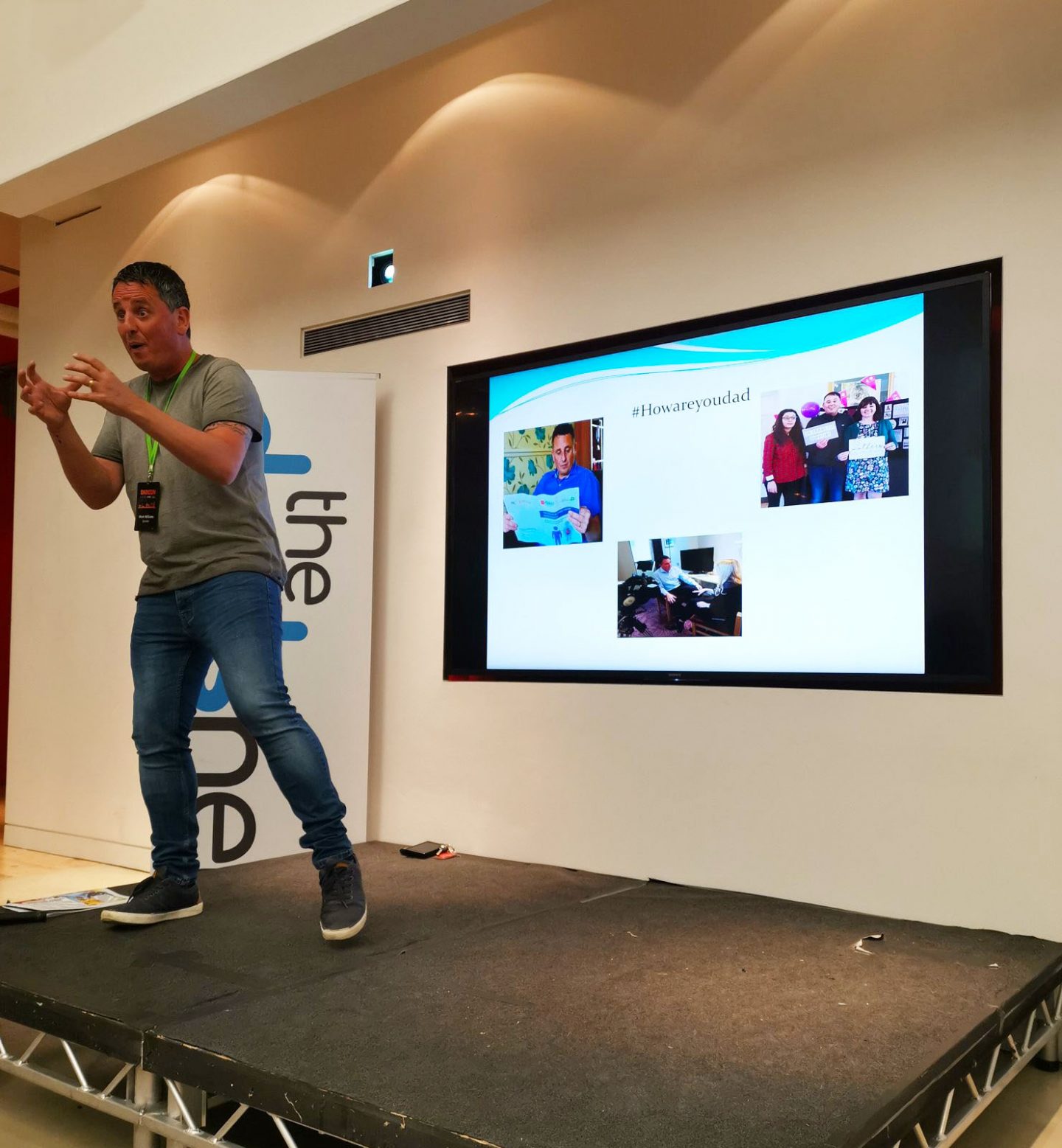Mark Williams is passionate about fathers mental health. He’s the founder of International Fathers’ Mental health Day, has spoken at numerous conferences and mental health events around the world and works with health professionals to help deliver better care.

Mark speaks from personal experience. He has had issues with alcohol, had a breakdown and considered taking his own life shortly after the birth of his son. Added to this, Mark’s wife, Michelle, had severe postnatal depression so he assisted her through difficult times also.
A couple of years ago, Mark interviewed me about my experiences of fatherhood for a video he was making. At the time, it was clear to me just how passionate he was about fathers and mental health.
It was great to reconnect for this Q&A. What I hadn’t appreciated was quite how much of a whirlwind Mark’s life has been over recent years! In addition to founding International Fathers’ Mental Health Day, he’s spoken at over 100 conferences, many of them overseas and co-founded the charity Dad Matters UK. Here’s mark’s story.
Mark, you’re a very prolific user of social media so anyone with an interest in mental health or parenting has probably heard of you. For those who aren’t so engrossed in the online world, can you explain exactly why you are so interested in men’s mental health?
There are many reasons why I fell into the area John. My beautiful wife had a traumatic birth in 2004 and severe postnatal depression. Also, I have worked voluntarily in the youth sector since 2006. Unfortunately, the media started writing negatively about young people and suicides in our county of Bridgend and what they reported was often inaccurate. This increased my interest in mental health, particularly men’s mental health.
A quick look at your website reveals you have personally experienced anxiety and postnatal depression and that your wife also experienced the condition. Can you say a bit more about your experiences of dealing with mental health?
I was never officially diagnosed with postnatal depression, but yes I was suicidal four months after my boy was born. My personality totally changed after his birth. I was using alcohol, while feeling anger and avoiding situations and I felt totally alone.
I suffered in silence, I didn’t tell anyone, not even my wife Michelle. I didn’t want my problems to impact on her mental health.
My body couldn’t cope and five years later I had a breakdown. I was diagnosed with entered community mental health services diagnosed with Attention Deficit Hyperactivity Disorder at the age of 40, plus anxiety and depression.
What impact did your mental health have on your family?
My wife knew I was different but without family support my condition could have been much worse. After my own depression, Michelle’s came back for the second time years later because she was worried about me.
I’m not going to patronise you and ask if you think men’s perinatal health receives enough attention, so instead I’ll ask why you think it doesn’t it?
It’s coming slowly. Unfortunately we are only now talking more about mums’ mental health, or at least we have done over the past 10 years as there’s been a big push to do so.
For men, I think recognition of mental health issues has improved in the last five years. Thinking positively, a day will come will come when all parents will have their mental health supported.
Is men’s perinatal mental health as big an issue as women’s? What would be the benefits of resourcing men’s mental health better?
Until we ask all dad’s and screen them during the antenatal and postnatal period, we will never know fully. We know it’s at one in 15 dad’s but some studies say even higher.
Early prevention saves money and most importantly lives. The biggest killer in men under 50 in the UK is suicide.
It’s not dissimilar to mums who suffered with birth trauma or antenatal/postnatal depression and then had to use other health services. If they were asked how they felt or screened, they could have been helped sooner and not had to use other health health services.
Let’s not forget the impact on children. If unsupported, the mental health of the parents can have an impact on any children in the family.
You have touched on a sensitive point there. Is there not an argument that the health service doesn’t provide women with the mental health support they need?
We still have big gaps and there is a postcode lottery dictating whether you will get specialist perinatal mental health services. Also, course we need extra health visitors and midwifery services along with funding for the third sector to support mums who just need a little bit of help before it manifests and hits crisis point.
You are the founder of International Fathers Mental Health Day. When does this take place and how can people get involved or show their support?
Anyone can get involved via social media or start a coffee morning for dads. It’s always on the Monday after Fathers’ Day in the UK.
Over here in Britain, Dr Andy Mayers helps me engage with other doctors around the world. It’s been getting bigger each year since 2016 This year it was officially recognised by the Time to Change calendar alongside World Mental Health Day. This is a global concern, not just something happening In the UK.
I don’t want this interview to solely focus on bad news and poor mental health provision. Can you give a couple of examples where people have received good support and care and the positive impact it has had?
John, I always wanted something positive to come out of something so bad. I know so many dads are now being diagnosed earlier and supported. I’ve personally helped dads who had made plans to die through suicide.
I feel really positive that health professionals totally get the message that if dad is struggling with his mental health, it can impact on mums and. Men are more likely to be asked how they feel and issues with men’s mental health is more widely recognised than it was when I started in 2011.
I recently spoke to a dad who has an 17-year-old child and a three month old. He felt we’ve move on massively over the years in terms of recognising men’s mental needs when they become fathers. Do you think things are moving in the right direction?
Yes, The NHS is now looking at ways to support dads as well as mums. I think it’s only a matter of time before we are going to see even bigger changes to maternity services with more stay at home and single dads than ever before bringing up their children.
Changing the subject for a moment, I know through my own involvement with the charity Movember that men’s mental health is improved massively when they have good social connections and support networks. Nonetheless, this is something men neglect, especially when they get busy with family life. Have you anything to say about this?
Yes, Movember did a report recently on the isolation of dad’s in the first year and said one in five dads disconnect with their friends. I think we are connecting more to why dads drink, avoid social situations and of course struggle like mums to bond with their babies.
It’s all about education, not just professionals but families need to recognise the symptoms and understand when someone might be struggling. That’s why I also love doing blogs like yours John.

In addition to being a high profile social media user, you’re also a very prolific public speaker. What’s been a speaking highlight this far and do you have any notable engagements coming up in the near future?
Speaking alongside incredible speakers and learning from them. I’ve just been honoured by the last prime minister for my work but the biggest achievement is personally knowing I’ve helped change when it comes to fatherhood and mental health.
Also, my mentor Dr Jane Hanley and I have a new book coming out for professionals in 2020 so that’s exciting considering I left school at 15 with nothing. I recently spoke at Oxford Brookes University with her along Mark Williams (not related to me!) who wrote the book Mindfulness, Finding Peace in a Frantic World, mindfulness being something I love doing myself.
If someone is concerned about either their own mental health or a friend / family member’s, what would you advise they do?
Of course, your GP should be the first person you speak to but speak to them as soon as you can. Your GP can arrange for you to speak to a team member who works in mental health. Andy Mans Club has a database for services in your areas called Hub of Hope. Just don’t suffer in silence as the quicker the help, the quicker the recovery.
Finally, where can people find you online?
Thanks John, I’m on twitter @MarkwilliamsFMH, Linkedin and now Facebook, just for education.







